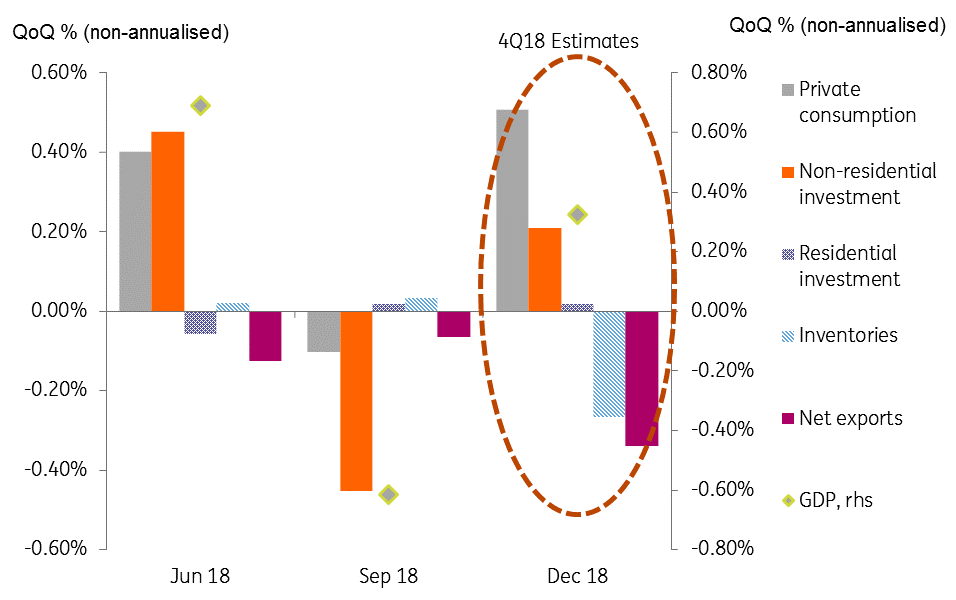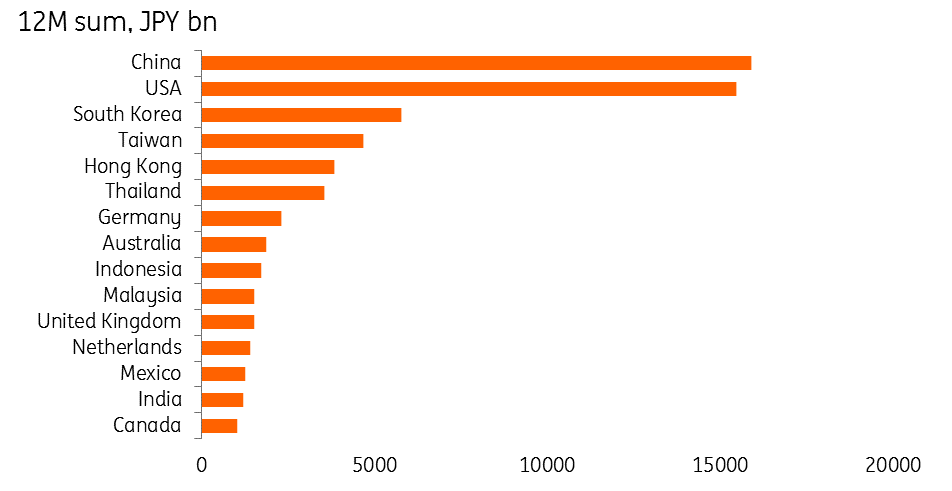Japan: No bounce
Things in Japan aren't looking as promising as we anticipated, with net trade the biggest scope for disappointment. This isn't too surprising in light of the weak global trade backdrop, though even without a trade war escalation we reckon the picture is still bleak for Japan's trade sector
For some time, we have been running with a more upbeat view on the economy than the Bank of Japan, who we felt were trying to talk the yen down.
But as we approach the release of the fourth quarter GDP release for 2018, we have to admit that things are not looking as good as we had hoped. 3Q18 was a terrible quarter for growth. But there were good reasons for that, namely terrible weather in the shape of Typhoon Jebi, the most powerful storm on earth in 2018.
Typically, when something of this nature happens, storm, flood, earthquake, volcano etc, we see a fairly dramatic drop in growth in that quarter, but then bounce back in subsequent quarters, and the GDP effect is often, thanks to rebuilding and replacement, better than the prevailing pre-crisis trend.
Estimates for 4Q18 GDP

Consumer spending may be the only exception to this. At -0.2% quarter-on-quarter in 3Q18, spending was sharply down from the 0.7% growth that preceded it. 4Q18 will probably deliver something around 1.0% QoQ based on the two months of household spending we have for 4Q18 and some educated guesses about how the December figure will turn out. That puts us about where we would have been in a world without typhoons.
In contrast, non-residential investment fell 2.8% QoQ in 3Q18, but we see it recovering only about half of that in the fourth quarter.
However, it is trade (net trade to be precise), where we see scope for the biggest disappointment. 3Q18 saw exports falling 1.8% QoQ. But imports also fell 1.4% in the third quarter and the net trade impact was negligible.
It looks from the trade data already available as if the 4Q18 export figures didn’t even make back the 3Q loss, whilst imports roared back with more than a 3% gain, leading to almost a 1% loss from the annualised GDP growth figure.
Perhaps it isn’t that surprising to see trade damaging the growth backdrop for Japan given the poor global trade backdrop. The 3-month growth figures for Japan show almost no destination growing faster in terms of absorbing Japanese exports than in the same three months a year ago.
4Q18 vs 4Q17 Export growth by destination

Combining the rate of growth in the chart above with the absolute absorption by country in the chart below, we can see that the slowdown in Chinese absorption is going to be the most important factor for the overall growth total. Moreover, our growth chart flatters the data. If we used the latest year-on-year comparison instead of the 3-month average, it would show that Japan’s export growth to China is now negative.
12M sum of Japanese exports by top destination

Other Asian countries, South Korea and Hong Kong, are not helping, though the picture is likely reciprocated for them by Japan. Even exports growth to the US, Japan’s second largest single country destination, has slowed substantially.
In other words, the picture, even with no escalation in the trade war shows Japan’s trade sector suffering. We know that across Asia, export flows have been hurt by the trade war, and it is not clear that we have yet seen the worst. We are assuming worse to come.
even with no escalation in the trade war Japan's trade sector is suffering
Were we to see the current 10% tariff rates on China replaced with 25% rates, then Japan would likely have serious growth issues to deal with, if not an outright recession. This isn’t our base forecast. A more plausible extension of the current tariffs seems to be a sensible working assumption. Even then, we suspect the consumption tax hike due later this year may be postponed (again) if the economy remains weak and the authorities see a need to support the economy.
Download
Download article
8 February 2019
February Economic Update: Stick or twist? This bundle contains 9 Articles"THINK Outside" is a collection of specially commissioned content from third-party sources, such as economic think-tanks and academic institutions, that ING deems reliable and from non-research departments within ING. ING Bank N.V. ("ING") uses these sources to expand the range of opinions you can find on the THINK website. Some of these sources are not the property of or managed by ING, and therefore ING cannot always guarantee the correctness, completeness, actuality and quality of such sources, nor the availability at any given time of the data and information provided, and ING cannot accept any liability in this respect, insofar as this is permissible pursuant to the applicable laws and regulations.
This publication does not necessarily reflect the ING house view. This publication has been prepared solely for information purposes without regard to any particular user's investment objectives, financial situation, or means. The information in the publication is not an investment recommendation and it is not investment, legal or tax advice or an offer or solicitation to purchase or sell any financial instrument. Reasonable care has been taken to ensure that this publication is not untrue or misleading when published, but ING does not represent that it is accurate or complete. ING does not accept any liability for any direct, indirect or consequential loss arising from any use of this publication. Unless otherwise stated, any views, forecasts, or estimates are solely those of the author(s), as of the date of the publication and are subject to change without notice.
The distribution of this publication may be restricted by law or regulation in different jurisdictions and persons into whose possession this publication comes should inform themselves about, and observe, such restrictions.
Copyright and database rights protection exists in this report and it may not be reproduced, distributed or published by any person for any purpose without the prior express consent of ING. All rights are reserved.
ING Bank N.V. is authorised by the Dutch Central Bank and supervised by the European Central Bank (ECB), the Dutch Central Bank (DNB) and the Dutch Authority for the Financial Markets (AFM). ING Bank N.V. is incorporated in the Netherlands (Trade Register no. 33031431 Amsterdam).